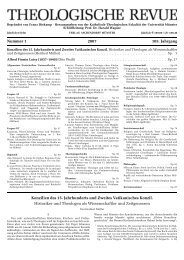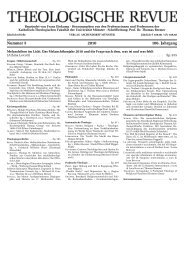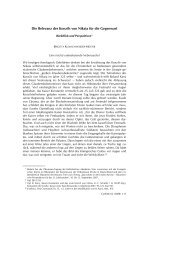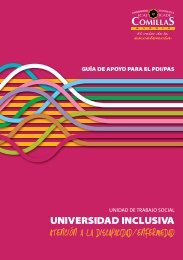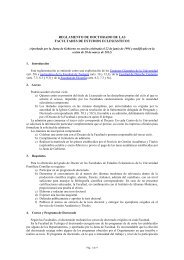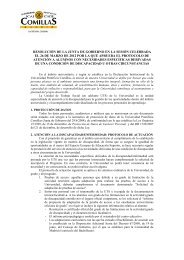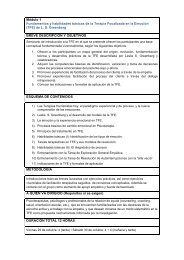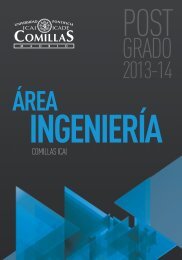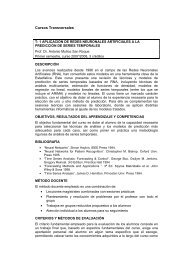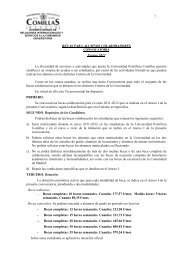EL MUNDO hOy. GESTIÃN DE LA DIVERSIDAD. UN IMPERATIVO ...
EL MUNDO hOy. GESTIÃN DE LA DIVERSIDAD. UN IMPERATIVO ...
EL MUNDO hOy. GESTIÃN DE LA DIVERSIDAD. UN IMPERATIVO ...
Create successful ePaper yourself
Turn your PDF publications into a flip-book with our unique Google optimized e-Paper software.
INTERNAcionaLIZACIÓN Y CAPITAL HUMANO<br />
Table 1.<br />
Table 1: NEO FFI and its facets<br />
NEO FFI and its facets<br />
Cross-cultural stability of an instrument can be considered as an evidence of its validity.<br />
Huge Cross-cultural amount of cross-cultural stability research of an has been instrument carried out can on the be Five-Factor considered Model as an<br />
evidence of personality of by its utilizing validity. the Huge NEO-PI-R amount and the shorter of cross-cultural version, the NEO-FFI. research McCrae has been<br />
carried and Allik out (2002) on have the presented Five-Factor a collection Model of selected of personality invited papers by from utilizing various the<br />
NEO-PI-R researchers across and globe the covering shorter various version, issues the in cross-cultural NEO-FFI. research McCrae on the and Five Allik<br />
(2002) Factor Model have (FFM). presented This volume a collection has also presented of selected data about invited the FFM papers from several from various<br />
cultures. researchers The robustness across of the globe FFM has covering been proved various across issues different in cultures, cross-cultural for<br />
research example, Chinese on the (McCrae, Five Factor Costa, & Model Yik, 1996; (FFM). Yik & This Bond, volume 1993), Estonian has also & presented<br />
Finnish (Pulver,<br />
data about<br />
Allik, Pulkkinen,<br />
the FFM<br />
&<br />
from<br />
Hämäläinen,<br />
several<br />
1995),<br />
cultures.<br />
Filipino<br />
The<br />
and French<br />
robustness<br />
(McCrae,<br />
of the<br />
FFM has been proved across different cultures, for example, Chinese<br />
Costa, del Pilar, Rolland, & Parker, 1998), India (Lodhi, Deo, & Belhekar, 2002),<br />
(McCrae, Costa, & Yik, 1996; Yik & Bond, 1993), Estonian & Finnish<br />
Portuguese (Lima, 2002), Russian (Martin, Oryol, Rukavishnikov, & Senin, 2000),<br />
(Pulver, Allik, Pulkkinen, & Hämäläinen, 1995), Filipino and French<br />
South Korean (Piedmont & Chae, 1997), Turkish (Gülgöz, 2002), Vietnamese<br />
(McCrae, Costa, del Pilar, Rolland, & Parker, 1998), India (Lodhi, Deo,<br />
(Leininger, 2002), sub-Saharan cultures like Zimbabwe (Piedmont, Bain, McCrae, &<br />
& Belhekar, 2002), Portuguese (Lima, 2002), Russian (Martin, Oryol,<br />
Costa, 2002), etc. Angleitner and Ostendorf (2000) presented the evidence for<br />
Rukavishnikov, & Senin, 2000), South Korean (Piedmont & Chae,<br />
robustness of the FFM in German speaking countries like Austria, former East and West<br />
1997), Turkish (Gülgöz, 2002), Vietnamese (Leininger, 2002), sub-<br />
Germany, and Switzerland. Rolland (2000), on the basis of the data from sixteen<br />
Saharan cultures like Zimbabwe (Piedmont, Bain, McCrae, & Costa,<br />
cultures, asserted that the neuroticism, openness, and conscientiousness dimensions are<br />
2002), etc. Angleitner and Ostendorf (2000) presented the evidence for<br />
cross-culturally valid. Rolland further states that extraversion and agreeableness<br />
robustness of the FFM in German speaking countries like Austria, former<br />
East and West Germany, and 4 Switzerland. Rolland (2000), on the<br />
basis of the data from sixteen cultures, asserted that the neuroticism,<br />
openness, and conscientiousness dimensions are cross-culturally valid.<br />
206



